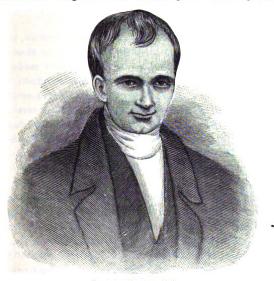John C. Marshman
Father and Son -
Early British Missionary Helpers to William Carey
The Baptist Encyclopedia, 1881

Joshua Marshman

Joshua Marshman, D. D., was born at Westbury Leigh, Wiltshire, England, April 20, 1768. He received such education as the village school afforded, and eagerly perused all the books that came within his reach. His love of reading was so notorious, that when he proposed to join the Baptist church, the members were afraid he had too much head knowledge of the gospel to have much heart experience of it, but their apprehensions in time passed away. In 1794 he removed to Bristol to take charge of a school supported by the Broadmead Baptist church, and was soon afterwards baptized and received into church fellowship. He joined the classes of the theological seminary, and for upwards of five years studied the classics, and also Hebrew and Syriac. The periodical accounts which recorded the labors of Carey awakened in him a missionary spirit, and in 1799 he and his wife offered themselves for service in India. Three other missionaries embarked with him in an American ship, the "Criterion," on the 29th of May, 1799, and landed at Serampore on October 13, seeking protection under the Danish flag from their anti-missionary countrymen in Calcutta. When the authorities found that the missionaries had arrived without a permit from the India House, they threatened Capt. Wickes, of the "Criterion," that his vessel should be refused entry unless the four missionaries appeared at the police-office, and entered into engagements to return forthwith to England. Representations were, however, made to the governor-general, Lord Wellesley, which resulted in the abandonment of all hostile proceedings against the vessel, but the missionaries were compelled to remain at Serampore. After the establishment of the mission in Serampore, Mr. and Mrs. Marshman opened boarding-schools, which soon attracted large numbers of scholars, and were a source of permanent income to the mission. In association with Mr. Marshman, Carey labored on translations of the Scriptures, preaching, and other missionary work. In 1806, Mr. Marshman commenced the study of Chinese, with the view of translating the Scriptures into that language, and, after fifteen years of arduous toil, he carried through the press the first Chinese Bible. He received the diploma of D.D. from Brown University in June, 1811. In 1814 he published "Key to the Chinese Language," towards the expense of which the government of India voted L1000. On the 31st of May, 1818, the first newspaper ever printed in any Eastern language was issued from the Serampore press, and was very popular among time natives. After the death of Dr. Carey, his already enfeebled constitution gave way, and although he rallied for a time, the capacity for work was exhausted. He died on Dec. 4, 1837, and his remains were laid in the cemetery with his departed colleagues.
John C. Marshman
John C. Marshman, son of the distinguished missionary, Dr. Marshman, of Serampore, accompanied his parents to India in early childhood, and spent many years in that country in various secular employments, especially identifying himself with Christian journalism. While a here boy he devoted himself with remarkable zeal and fidelity to the work in which the Serampore missionaries were engaged. In conjunction with his father he labored in producing the Chinese version of the Scriptures. He established the first paper-making works in India, issued the first newspaper published in the Bengali language, and founded the English weekly newspaper, the Friend of India, which in his hands became one of the most influential journals in the world, and a potent factor for good in the Indian dependencies of the British crown. In its early days this newspaper escaped suppression from the British authorities by the protection of the Danish government, under whose flag it was published at Serampore. It was outspoken in its denunciation of official misdoings, and fearlessly advocated the civil rights of the native population. But whilst Mr. Marshman continued to be a layman he did efficient work in connection with the Baptist missions, especially devoting himself to the interests of Christian education. He gave a very large proportion of his increasing income year by year to the maintenance of Serampore College and other educational institutions. He became in later life the friend and trusted adviser of the government in important affairs, and few men exercised a greater influence upon the rulers and the ruled. His literary labors also procured him high standing. The lives of Carey, Marshman, and Ward, together with his history of India, will long perpetuate his name. His eminent services were recognized by the English government by the bestowment of the honor of C. S. I. (Companion of the Order of the Star of India). He spent the closing years of life in his native land, enjoying the esteem of a large circle of friends, and serving the cause of Christian missions and philanthropy. He died July 8, 1871, in his eighty-third year, and was followed to his grave by many distinguished men, including Lord Lawrence, formerly governor-general of India, and other famous Anglo-Indian statesmen, who had personally known his character and worth. Mr. Marshman's views concerning missionary methods of operation occasioned much discussion. He held with tenacity the opinion that India and the other Eastern nations could not be converted to Christianity by Europeans, and that the business of missionaries was to raise up "native apostles." When he died he was engaged upon a series of biographies of the viceroys of India, a work for which he was universally regarded as better qualified than any man living.
============ [The Baptist Encyclopedia, 1881. p. 751. Scanned & formatted by Jim Duvall.]
More Baptist Bios
Baptist History Homepage